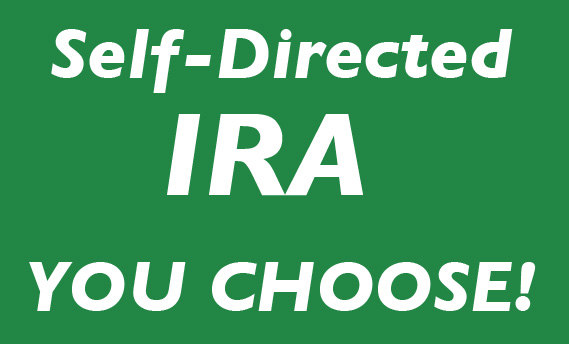How to make alternate investments with your IRA
The Individual Retirement Account (IRA) was introduced in 1974 by Congress to help encourage those who did not already have a retirement plan or pension at work to save for their own retirement.
The mantra of the day was to encourage individuals to save for their own retirement. The original plan would allow individuals to open an IRA providing they did not already have another company-sponsored program established. In 1981 the IRA was expanded to include everyone, whether or not you already have another retirement plan or pension at work.
According to the IRS, code sec 408(a) the official definition of an IRA is a trust or custodial account, created or organized in the United States for the exclusive benefit of an individual or his/her beneficiaries.
Types of IRAs
There are two primary Types of IRAs. Each has the following characteristics:
1. Traditional IRA – A Traditional IRA generally allows tax deductible contributions. There are factors that affect the “deductibility” such as if participants are already using an employer pension account. The earnings from the IRA investments are taxed when distributions are taken after reaching at least 59 ½ years old.
2. Roth IRA – The Roth IRA was created in 1997 as part of the Taxpayer relief act. The major differences compared to the traditional IRA are that the contributions are not tax-free, but the distributions are tax-free.
Advantages:
One major advantage of using an IRA to save for retirement is that the IRA account is held separate from and the account holder cannot easily access the funds without paying taxes and penalties. This is an advantage because it makes the removal of the funds more difficult which forces most account holders to leave the funds separate from their every day lives and allow the earnings to compound until they are ready to retire.
In essence the account is designed to be held until retirement, which is a good thing as many people today would access their IRA if it were easy to do so. In most states the funds in IRA’s are also protected from all potential creditors.
Opening an IRA
You can open an IRA at a wide-variety of institutions including banks, brokerage firms, credit unions and even insurance companies. Nearly half of all IRA assets are held with banking institutes and the most popular banking institute investments are Certificate of Deposits (CDs) and money-market type accounts. Account holders feel comfortable working with their banks and the FDIC insures them up to $250,000.
The challenge with investing in CD’s is that the rate of return is currently very low and there are early withdrawal penalties that can be costly. Credit Unions also provide IRA accounts and generally offer slightly better rates than most banks. Brokerage type accounts are available at both banking institutions and actual brokerage businesses. Brokerage accounts work well for the account holder who has an appetite for investing in the stock market. These types of accounts allow the account owner diversity in investing in mutual funds, US stocks, natural resources, etc.
Alternative Investments with a self-directed IRA
If you want to invest your IRA into alternative investments beyond the traditional CDs, stocks, bonds and mutual funds then you will want to explore the upside potential of using a self-directed IRA. Many banking and brokerage businesses advertise that their accounts are self-directed and they give the account owner the flexibility to self-direct their accounts, but in reality the vast majority of these IRA institutions only allow investment in their products of the traditional stocks, bonds, CD’s and mutual funds. If an account holder desires to invest their retirement funds into investments such as:
• Oil and Gas – Production, royalties and mineral rights can create huge returns for the investor who understands the oil and gas investing models.
• Precious metals including gold and silver – Hedge against all political, social and other influences including inflation.
• Private and Public Stock – Venture capital type investments
• Real Estate – Buy, sell, rent in today’s market can create huge returns for the savy investor.
• Notes and mortgages – Lend money on real estate or purchase discounted notes. It is not unusual to purchase notes at 15% discount and create yields of 15 – 25%.
• Tax lien certificates – Investing in tax delinquent real estate
These investments extend beyond the traditional stocks, bonds, mutual funds and CD’s that most banking and brokerage institutions offer to their clients. They also take specific knowledge of the account holder in order to successfully invest and make great returns. However, given the market conditions in these investment classes the knowledgeable investor can make some fantastic returns using self-directed IRA’s.
If you are looking for one of these alternate investments for your IRA, you will need to find a truly self-directed IRA plan. A truly self-directed firm will likely not offer any products for you to invest into, but will allow you as the account holder to choose the investment you want for your IRA.
The IRA was created to help people save for retirement and given the uncertainty of long-term social security the IRA is an investment that everyone needs to carefully consider.
Parting Thoughts
“Compound interest is the most powerful force in the universe.” – Albert Einstein.
Einstein provided us with so many great truths but he calls compound interest the most powerful force in the universe and financially speaking he is certainly right on. An IRA account allows people to save today, earn returns that will be compounded for many years and be prepared to retire. The IRA is one of the best gifts that our Government has ever given the citizens of our country and everyone needs to consider using this outstanding retirement vehicle.
If you plan to invest, I highly recommend a Roth Self-Directed IRA. Once you have it established your IRA can become a private lender, a wholesaler, flipper or buy and hold real estate. The beauty of self-direction is that the account holder is allowed to make their own investment decisions as long as they avoid prohibited transactions.
What is holding you back from taking control of your retirement? Invest now and succeed!
How to make alternate investments with your IRA







